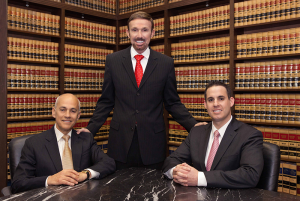
When determining issues such as the division of property, child support and spousal support, the Riverside family courts focus on a number of important facts regarding the divorcing couple’s marriage. Of these factors, one of the most important is the length of the marriage.
How Long Was the Marriage?
For purposes of determining the ending date of a marriage, the court will look at two factors: the date of the physical separation, and when one of the spouses formed the intent not to resume the marriage.
Physical separation is an objective test, meaning the court will look at the facts that support the notion that a couple has separated. This does not require that the spouses move into separate homes. For example, a couple can be considered “physically separated” when one spouse decides to use a different bedroom in the home or when the spouses mutually agree to designate rooms that are exclusive to each spouse.
The intent test is a subjective one, meaning that it depends entirely on when one of the spouses decided in his or her mind that the marriage was over and that there would be no reconciliation between them.
Once the court determines a date upon which there was a physical separation and the intent of one spouse to end the marriage, that date will become the ending date of the marriage.
Spousal Support and the 10-Year Rule

The purpose of spousal support (or alimony) is to minimize the economic impact of the divorce on the spouse who was not the couple’s primary income earner. Thus, a support payment ensures the supported spouse has a safety net that allows him or her to maintain an income level or lifestyle that is consistent with the one he or she had become accustomed to during the marriage.
To calculate a payment schedule that will lessen the impact of a divorce, the Riverside family court will look to the length of the marriage to determine how long the supported spouse should receive payments. The court will generally divide marriages into two types: short-term (less than 10 years) and long term (10 years or more). However, the 10-year mark is not a hard and fast rule. In some cases, a court may determine that a marriage of less than 10 years is still a “long-term” marriage.1
If you were in a short-term marriage, there is a presumption that spousal support payments will last for approximately half of the length of the marriage. So, if you were married six years and you are ordered to pay spousal support, you will be generally required to make those monthly payments for three years.
However, if you were in a long-term marriage, California Family Code section 4336(a) gives the court the discretion to retain jurisdiction over the divorce indefinitely. This means the court has the right to continue making decisions and adjusting payments, unless the parties come to their own agreement. Therefore, the Riverside court has discretion to order support payments be made until the supported spouse marries another person or until the death of the supporter or supportee.
Child Support and Long-Term Marriages
Unlike the calculations for spousal support, the Riverside family court will not take the length of the marriage into consideration when calculating child support. Instead, it is the age of the child (or children) that determines how long child support must continue.
In California, child support generally continues until the child reaches 18 years old. However, if he or she is unmarried and is still a full-time high school student at that age, the support will continue until the completion of 12th grade or until the child reaches the age of 19, whichever occurs first.
Community Property and Marriages of 10 Years or More
California is a community property state, which means that generally all property (real estate, investments, wages, etc.) is presumed to belong to the community and to be divided equally among the spouses upon divorce. Whether the marriage lasted 10 years or more does not change how much of an equal split each party gets, but the ending date is very important because it determines when the community stopped receiving benefits from one or both spouses’ salaries, investment income, and so forth.
Contact a Riverside Divorce Attorney at Wallin & Klarich

Divorce is never easy, especially when you decide to end a marriage that has lasted a decade or more. It can be the most physically, emotionally and mentally exhausting period in your life, but there is no reason you have to go through it alone. You deserve a caring and experienced attorney who can help you navigate your way through the Riverside family court system.
At Wallin & Klarich, our more than 30 years of experience working within the family court system in Riverside has taught us how difficult this can be, and that is why we are dedicated to giving our clients the best possible representation in their case. Contact us today for a free, no obligation phone consultation.
With offices in Los Angeles, Sherman Oaks, Torrance, Orange County, San Diego, Riverside, San Bernardino, Ventura, West Covina and Victorville, there is a Wallin & Klarich attorney experienced in California family law near you, no matter where you work or live.
Call us today at (888) 749-7428 for a free, no obligation phone consultation. We will get through this together.



